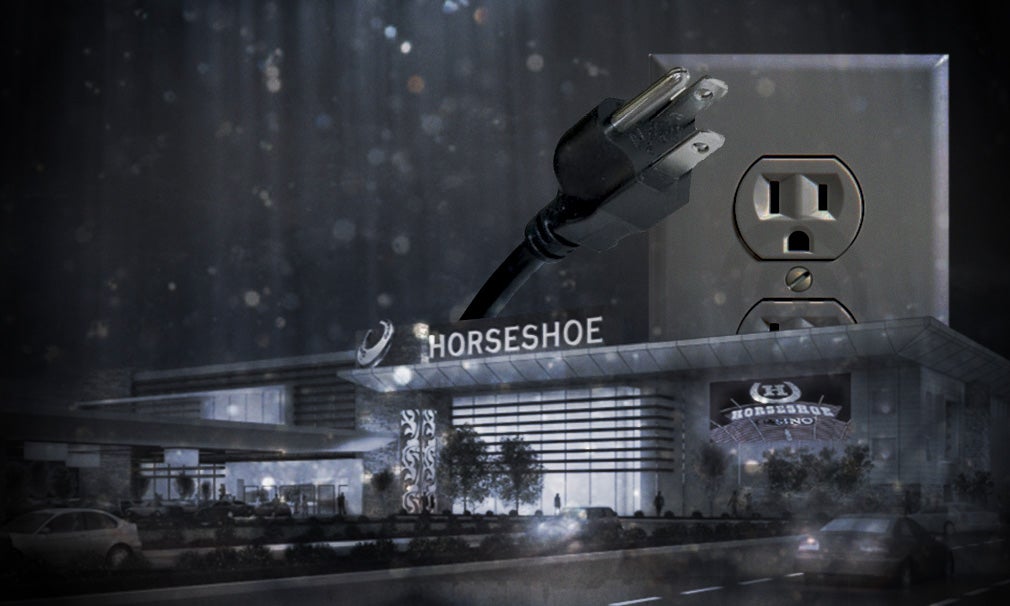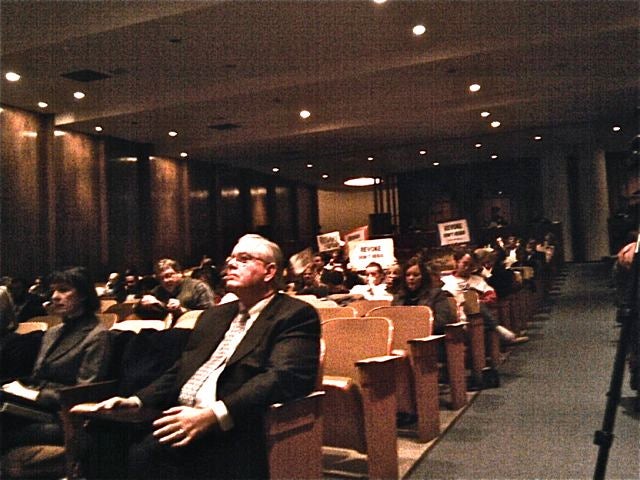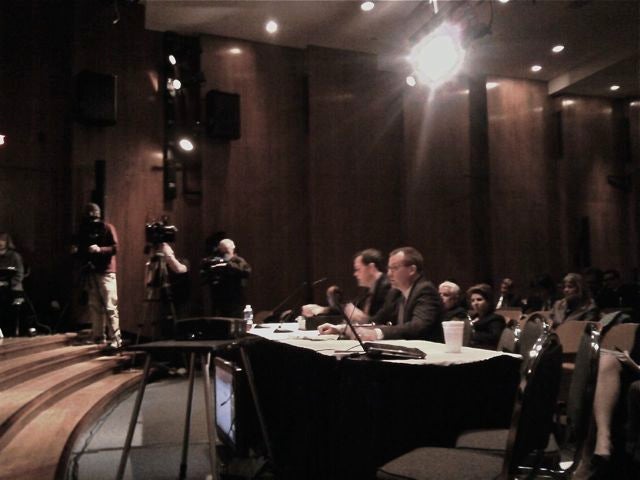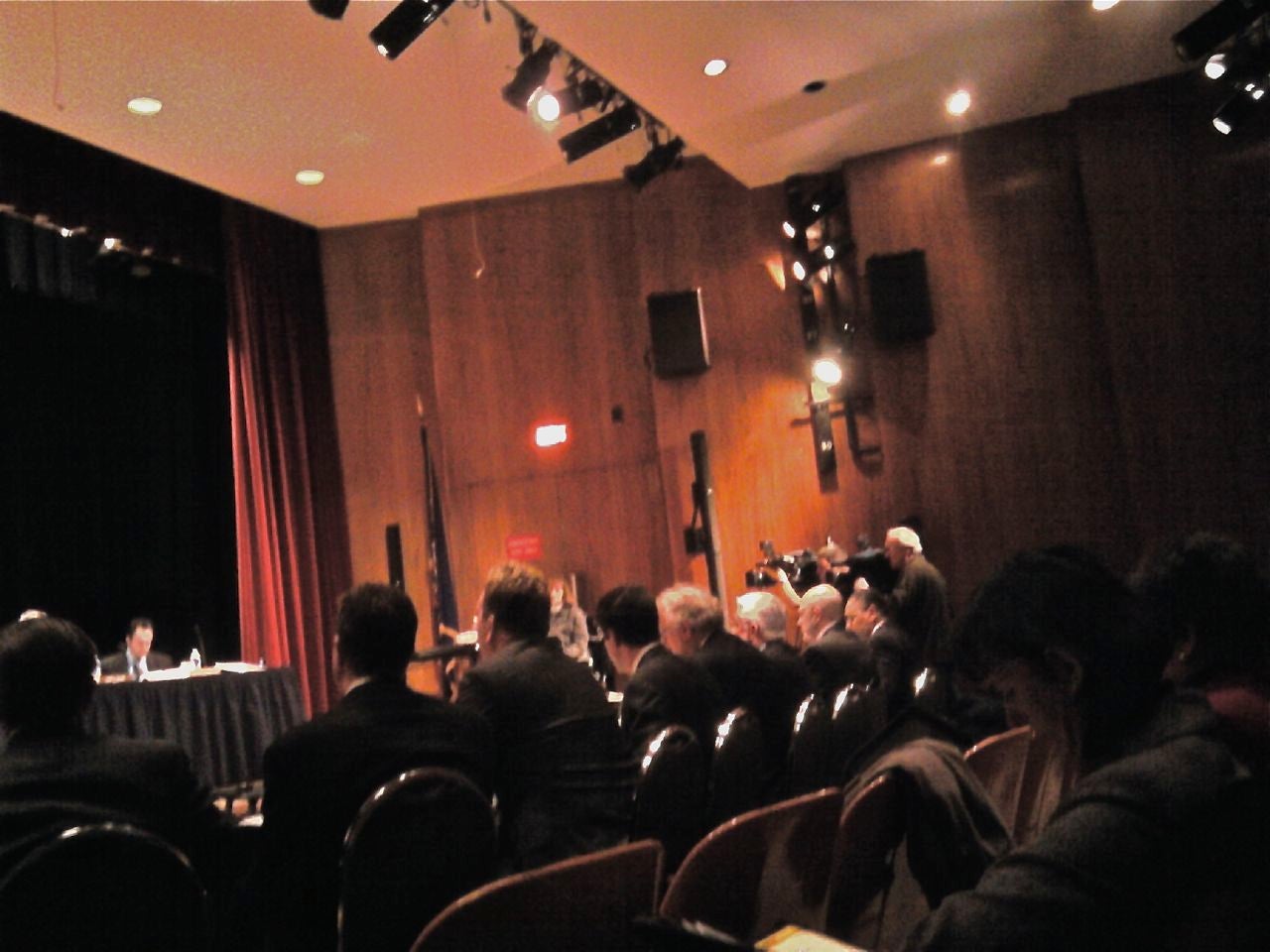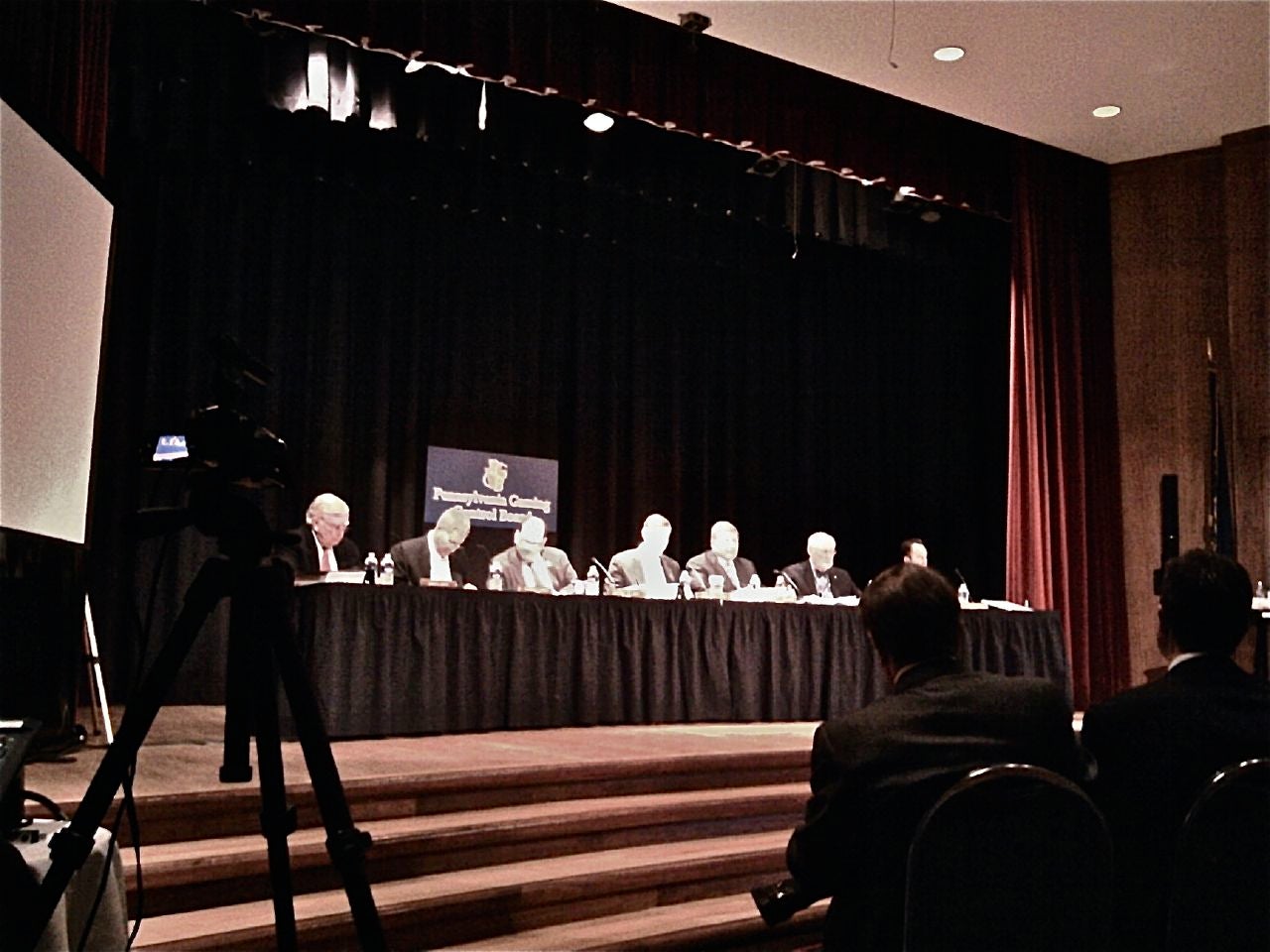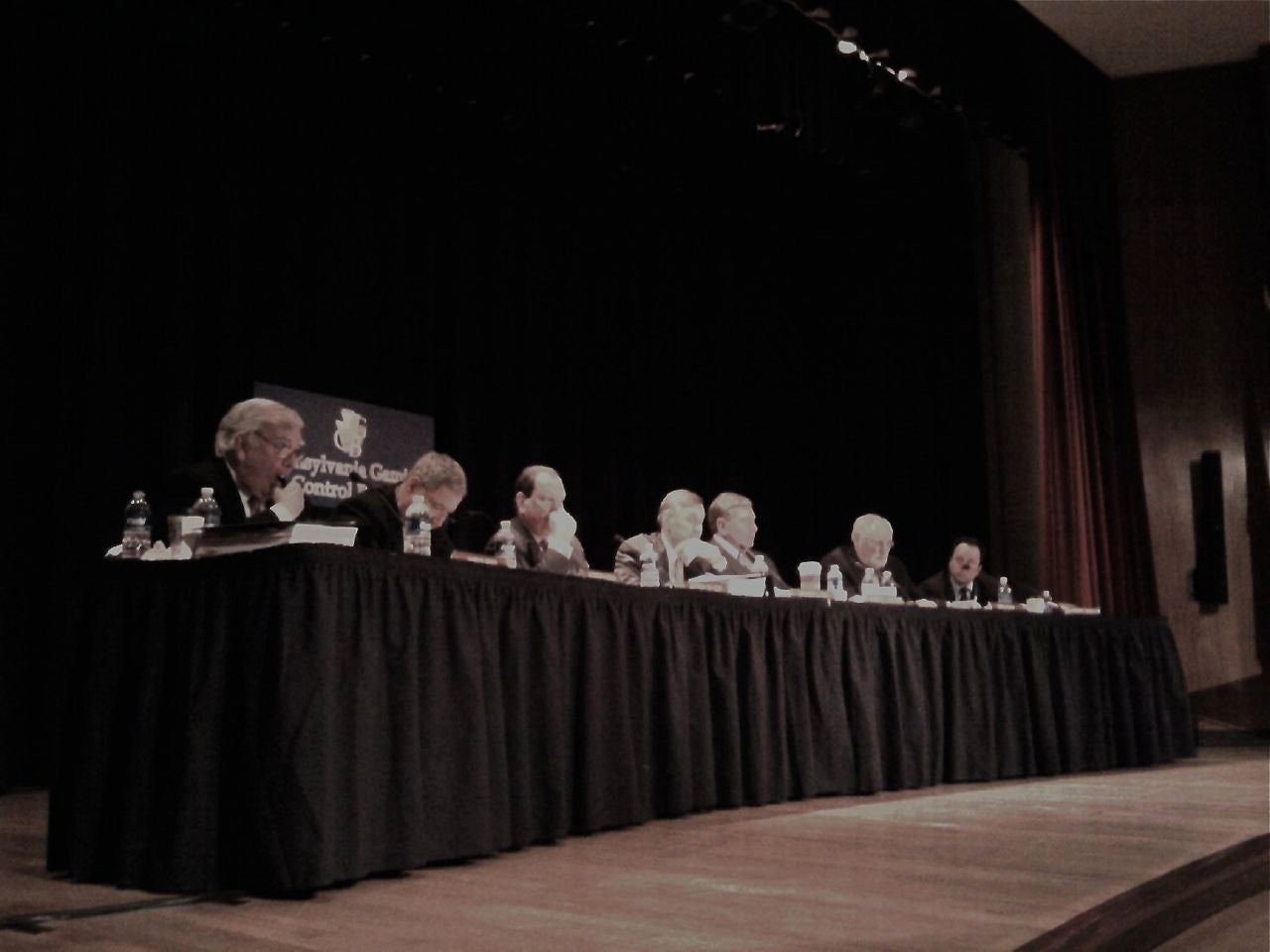Gaming Board revokes Foxwoods’ license
Despite the assertions of attorneys for Philadelphia Entertainment and Development Partners and Caesars that good progress had been made toward nailing down financing and partnership agreements for the long-awaited and often-stalled South Philadelphia casino, the Pennsylvania Gaming Control Board voted 6-1 Thursday to rescind the license it granted in 2006.
The board makes its decision.
After the vote, Caesars attorney Bill Downey left without taking questions. PEDP attorney Fred Jacoby excused himself to make a call first, then spoke to a throng of reporters with cameras, recorders and notebooks. Jacoby said his client is pondering an appeal, but won’t make that determination for certain until the board releases a written adjudication, a document that will outline the reasons for its decision. A PGCB spokesman said he didn’t know when that would happen, but it would be a matter of weeks, if not longer.
PEDP and Caesars attorneys and executives testified in an update session early in the meeting that the two casino interests have firm commitments for $46 million in financing from current and would-be owners – PEDP and Caesars. But the project needs another $75 million from new owner/investors/ stakeholders who have yet to be pinned down, plus an additional $200 million from lending institutions who would not have equity in the project, to get the casino built.
Cyrus Pitre, chief enforcement counsel with the Pennsylvania Gaming Control Board’s enforcement arm, told the board that the financing and partnership documents literally contained some blank spaces, and also outlined conditions that are provisional, and would only happen dependent on other events, such as approvals from the board and further negotiations.
The documents produced by PEDP and Caesars did not show iron-clad agreements for how the South Philadelphia project would be paid for or run, Pitre said.
Here is the entire PEDP/Caesars progress update
But representatives for PEDP – which has been commonly known as Foxwoods – said they have signed letters from two major lenders they would not name during the public session saying they plan to provide the debt financing. They also said that Caesars – which until recently was called Harrah’s – has agreed to a bridge loan of up to $10 million in equity financing to hold the project over until other investors can be found. Pitre pointed out the $10 million bridge loan would only be made if another $19 million is raised by the partners elsewhere.
The casino’s attorneys and executives indicated they were not worried about raising the money. They said some documents necessary for soliciting investments from potential investors were just finished Friday, and they would be showing them to potential equity investors immediately if the board did not revoke the license Thursday.
PEDP attorney Jacoby reacts to the decision, takes reporters’ questions.
“I’m very much disappointed,” Jacoby said after the decision. “I think that the documents we gave them are very much consistent with the documents they’ve seen with other deals, and have the same kind of closing details that you would expect to see in any deal.”
Charity Issue
Board members’ questions showed they were concerned about the charitible component of the project, which is one of the major reasons this project was chosen over others. Jacoby said the current agreement would actually fund more money to charity, sooner than under the old plan. But some board members did not seem to like new provisions that would direct millions of dollars to the Foxwood tribe’s museum. Initially, $2.5 million would go to local charities and $2.5 to the museum, which board members noted, is not in Pennsylvania. Another $3.5 million would go to the museum over the next seven years.
But Jacoby said that 2 percent of net operating revenue would go to charity each year. In addition, while the charitible trusts of several Philadelphia families would own a smaller share of the casino under the proposed agreement, making way for Caesars to own a one-third interest. Originally, Foxwoods and the charities each had a 30 percent stake. They would have a 1.25 percent interest under the new agreement.
James Ginty, a Rendell appointee who is a former AT&T executive, was the lone board member who voted against revoking PEDP’s license. “I share the frustration of my colleagues with the lack of progress,” he said before the roll call vote was taken. But he said he was concerned about the jobs and tax revenues that would be put at risk if the project lost its license.
It was not just the delay that could result from appeals and the selection of a new licensee that was on Ginty’s mind. “More worrisome to me is the very real possibility that the frustration in the state legislature” would result in action that removes the license from Philadelphia altogether, he said.
At that prospect, a little cheer went up from the half-dozen or so Philadelphia-based anti-casino activists in attendance, who throughout the meeting had held signs urging the board to revoke the license.
Gaming board chief counsel Doug Sherman talks about what’s next.
Board members would not comment on their decision after the meeting. Doug Sherman, the board’s chief counsel, said that his office believes any appeal would go through Commonwealth Court, but he knows there are differences of opinion on that. Other matters relating to casinos have gone straight to state supreme court.
Much about what happens now will have to be determined by the board in the weeks to come, Sherman said, because the gaming law doesn’t specifically address it.
For example, he didn’t know whether the board will develop procedures to identify a new license holder and start that process soon, or if it would wait until any appeals are resolved.
The law also doesn’t specify whether the $50 million application fee PEDP paid when it applied for the license is refundable. Sherman said that money has already been applied to property tax relief. Pitre has said at previous meetings that he does not believe it is refundable. Jacoby said after the meeting that his client believes it should be returned.
Jacoby said after the meeting that the financing and partnership documents provided were exactly as complete as could be expected in such a large deal.
Since Caesars and PEDP just reached an agreement Friday, there was no way that the package of documents that had to be shopped around to potential investors could go out earlier, he said.
And the hard work in obtaining the debt financing – the money that comes from financial institutions – is getting the confidential letters of intent to lend, he said. The lenders were committed, but naturally would have a way out until the license status was certain.
Jacoby acknowleged that the funding for the Pequot museum seem to have an impact on the board. He said he always thought “charity was charity,” but that apparantly, that isn’t so.
Jacoby and another PEDP attorney, Robert Graci, said that it was important to remember that the board made a decision based on the petitions for summary judgment filed earlier this year, not on the update made today.
Jacoby said his team still maintains that the board can’t legally revoke PEDP’s license because state gaming law doesn’t adequately define the standards a license holder must maintain.
Pitre and deputy enforcement council Dale Miller have argued that the standards that apply to applicants also apply to licensees, particularly since applicants sign a statement saying they will continue to uphold the standards, which include financial suitability. That is one of the terms Jacoby has argued is ill-defined.
Jacoby said he had expected that the board would Thursday congratulate PEDP for making such good progress, and perhaps set another benchmark for them to achieve. He did not expect the revocation, he said.
Anti-casino activists express happiness, gratitude for board’s decision.
The Casino-Free activists were also surprised. “Stunned,” said South Philadelphia resident Mary Stumpf. Several activists said they appreciated the board taking this stand under what the guessed was enormous political pressure. The activists were already celebrating, but also pledged to work toward keeping the second license slated for Philadelphia from being reissued.
Casino-Free Philadelphia will try to keep the license from being re-issued in the city.
A Johnstown-area legislator has said that his community would love to have it. Some other casino entities have expressed interest in the license.
When Steve Wynn was a prospective Foxwoods partner, he said he wasn’t ruling out bidding for the license himself, should it become
available. And a series of petitions filed by Donald Trump’s company show a pretty clear indication he is still interested in the license. A Trump team bid on the license when Foxwoods did, but was not chosen.
One proposal floating around Philly would save the SS United States by making the ship a key portion of a casino complex.
A Project with Phases
Casino representatives were seeking approval to build the project in two phases. They were also looking for a deadline extension so that the first phase would not have to open until December 2012, but Caesars vice president Don Marrindino said the project, which would be called Horseshoe, would open in the third quarter of that year.
It would have included 151,000 square feet of space, including a 64,000 square foot gaming floor with 1,500 slot machines and 70 to 80 table games. He called it a “big limit” casino, where bets of $50,000 not being unusual. He described a steakhouse, a balcony overlooking the Delaware River, a partnership with a world class chef, a noodle bar and a sports bar. About 650 construction workers would have been hired, and when open, the casino would have employed 1,200 employees, including 950 full time jobs. The second phase would add more slots and table games and a poker room.
The petition to revoke was filed by the Office of Enforcement Counsel back in April. Much has happened since then, including the entrance and exit of Las Vegas casino mogul Steve Wynn and the entrance of Harrah’s, which has since its name to Caesars.
When Foxwoods, more formally known as Philadelphia Entertainment Development Partners, and Caesars failed to file documents outlining the financing and new partnership agreements by the November’s board meeting, board member Gary Sojka made a motion to approve the board’s Office of Enforcement Counsel’s petition to revoke the casino concern’s license. But the board instead approved a second motion from board member Kenneth McCabe, tabling Sojka’s motion until today, and giving Foxwoods and Caesars until last Friday to file partnership and financing documents.
Documents were filed last Friday, and representatives of the casinos said they had made the deadline. A gaming board spokesman said he could not comment on the contents of those documents.
Philadelphia Entertainment Development Partners and Caesars have also recently filed other documents, asking the state gaming board to approve a change in the casino’s control, grant more time for the casino to open, and allow for changes in design. They filed more than 20 exhibits including loan documents, partnership agreements, a management agreement and various debt and finance-related documents with the gaming board’s office of hearings and appeals.
At the November meeting the board was presented with a rendering of the proposed South Philadelphia casino, with the name Horseshoe on top of it. Caesar’s operates casinos in other parts of the country with the Horseshoe name.
Long-running Battle
The PGCB decision marks a key point in the long Foxwoods saga.
For years, it was not just activists and residents, but a contingent of state lawmakers that represent Philadelphia and city council members who were fighting Foxwoods and SugarHouse.
Many did not like the waterfront locations of the casinos. Others were focused on traffic issues, crime or addiction problems they said the casinos could bring.
Philly lawmakers resented the fact that the state gave them no say. Reached by phone after the hearing, State Rep. Mike O’Brien said, “The house of cards built on half-truths and misrepresentations has finally collapsed.”
O’Brien said he fully anticipates an appeal, so no final decision will be in place for at least six months.
He also said he doesn’t think there should be another casino in Philadelphia or the environs. “I think the fact that revenues are below expectations at SugarHouse clearly shows that the Philadelphia market is saturated,” he said, referring to the current existance of SugarHouse, Harrah’s Chester and Parx and the Valley Forge proposal. Adding another would be “financial folly,” he said.
Mark McDonald, spokesman for Mayor Michael Nutter, said the mayor remarked that it had been a long journey to this point. But Nutter doesn’t have a position on the decision, McDonald said. “We don’t really know at this point why the board acted the way it did,” he said. While one can assume it was due to the new plan and financing presented to the board, the specifics will be in the written adjudication, and the mayor is waiting to see that before commenting on the revocation, McDonald said.
What Nutter is already thinking about is $35 million in lost tax revenue from the casinos in fiscal years 2013, 2014, and 2015 – that’s $12 million per year from a budget of about $4 billion. The loss definitely hurts, McDonald said. But the city does have time to react, since the dollars were never slated for the current budget, or the one the mayor and council are about to start workingon for fiscal year 2012.
The state and federal officials lost a string of state supreme court cases earlier in the casino battle. Eventually, they came to accept that SugarHouse was going to happen, but continued to oppose Foxwoods’ location.
The site would create too many traffic problems they said. An agreement was hashed out where Foxwoods would have relocated from the waterfront to East Market Street. The city and state officials said the casino could at that location help to revitalize a struggling part of the city.
Citizens groups didn’t like it any better. Asian Americans noting the proximity to Chinatown felt targeted and vulnerable. Others said it would mar the historic district.
But Foxwoods never officially asked the gaming board for a change in venue, and the board ordered them to stay on the waterfront before they ever did.
The city is nearing completion of a master plan for the central Delaware Waterfront, designed to guide the revitalization of the area
over the coming decades. The draft plan includes several scenarios for the area around the Foxwoods site. Options have been sketched out, based on the uncertainty of what would happen at Reed Street. Stay tuned
Contact the reporter at kgates@planphilly.com
WHYY is your source for fact-based, in-depth journalism and information. As a nonprofit organization, we rely on financial support from readers like you. Please give today.



